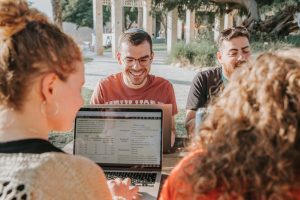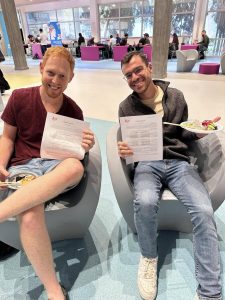A Unique Path to Higher Education
Ariel grew up in Teaneck and attended TABC before spending two years learning at Yeshivat Har Etzion (Gush). From there, he was drafted into the IDF, serving for three years in the Intelligence Directorate. After his service, he spent another year learning at an Israeli Hesder yeshiva, Yeshivat Otniel, before beginning his academic journey.
The transition to Israeli academia wasn’t immediate. Ariel had to complete a year of mechina at BGU, an intensive preparatory program that helps students meet the academic standards required for university admission. This enabled him to fill in gaps in subjects like math and physics that many Israelis complete in high school. (Ed Note: With BGU’s new Olim L’Academia program, olim and future olim can start their studies at BGU in English without enrolling in a mechina, and then transfer to Hebrew tracks the following year).
Starting his degree six years after high school, Ariel found himself in good company. In an Israeli university setting, particularly in STEM fields, it’s common for students to be in their mid-20s due to army service, gap years and travel. Finding himself at the same stage of life as his peers definitely helped with the social integration in his particular setting.
Why Mechanical Engineering?
Ariel had loved studying physics in high school but never saw himself as a “math person.” His exposure to the mechanical and physical elements of weapon systems during his army service was what initially sparked his interest in engineering. . That experience, combined with his personal interests, led him to mechanical engineering.
Mechanical engineering also appealed to him because of its broad applications. He knew that it would open doors to multiple subfields. “Mechanical engineering is known as a ‘super engineering’ field—it gives you a solid technical foundation with flexibility for the future,” he explains.
The BGU Experience
Ben-Gurion University is known for its student-centered culture. Beer Sheva, sometimes called the “Capital of the South,” has a unique dynamic—students move there and create a tight-knit community, similar to the American college experience. The area surrounding the university is packed with student life, making it one of the most immersive university environments in Israel.
Academically, BGU is highly regarded in STEM fields, particularly engineering. The atmosphere at BGU is rigorous but supportive. “The culture is not cutthroat,” Ariel says. “You know you’re going to work hard, but the university and your peers are behind you.”
BGU also emphasizes entrepreneurship. There’s a venture capital fund on campus funded by the university and run by students, and from their second year of studies, students can train as analysts and apply for funding for their own start ups. The universities entrepreneurship center offers a variety of programs to teach students how to identify needs, pitch ideas, and develop projects.
Ariel is also part of BGU’s Formula Racing team, a hands-on engineering project where students design, build, and race a car in international competitions. Working on the chassis (frame) team, Ariel gains invaluable experience mimicking a real-world engineering company structure, complete with marketing, HR, and business development divisions.
JLIC BGU: A Growing Community for Israelis and Anglos in Beer Sheva
Despite being in Israel, religious life on campus wasn’t always easily accessible. Before JLIC launched in Beer Sheva, there wasn’t a central hub for religious students. “You’d think religious life would be everywhere in Israel,” Ariel notes, “but in some ironic way, because it’s everywhere, it can also be nowhere.”

That changed with JLIC BGU. The program, led by Rav Idan and Prielle Rakovsky, has created not just religious programming—shiurim, chaburot, and an open beit midrash—but also a strong social environment, helping religious students find each other and build a community.
“The establishment of JLIC as a home for both anglos and Israelis in Beer Sheva has been, in my opinion, a smashing success. Having grown up in the U.S., JLIC is where I can experience a taste of home. Around Israelis it’s often difficult for anglos to bring their full selves whether because of language or other barriers, so in this quasi-Anglo environment I find I am able to. And then I bring my Israeli friends and they can see that side of me too, which is great.”
The goal is to continue growing JLIC’s presence and expand the Anglo community while still integrating with Israeli students. “Beer Sheva has huge untapped potential for Anglos,” Ariel explains. “It’s an incredible university, it’s affordable, and the city is developing rapidly.” New high-rise apartments, a growing high-tech park, and improved transportation links to Tel Aviv make Beer Sheva an increasingly attractive place for students and young professionals.
Looking Ahead
Ariel hopes to work in the defense industry after graduation, combining his army experience with his engineering studies. He’s also particularly interested in thermodynamics, renewable energy, and environmentally friendly engineering solutions. “Last semester’s thermodynamics course blew my mind,” he says, eager to see where his passions lead.
Ariel’s journey—from Teaneck to Beer Sheva, from the army to academia—reflects the challenges and opportunities of building a life in Israel. With BGU’s strong academic programs, an expanding city, and a growing JLIC community, Beer Sheva is becoming an increasingly viable option for Anglos looking to study and integrate into Israeli society.
